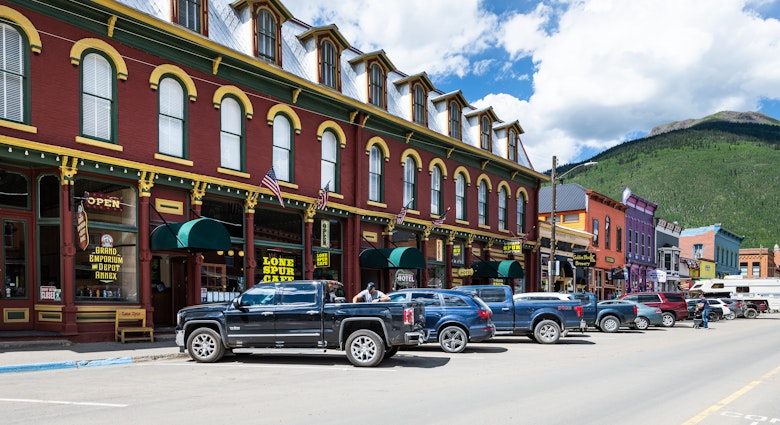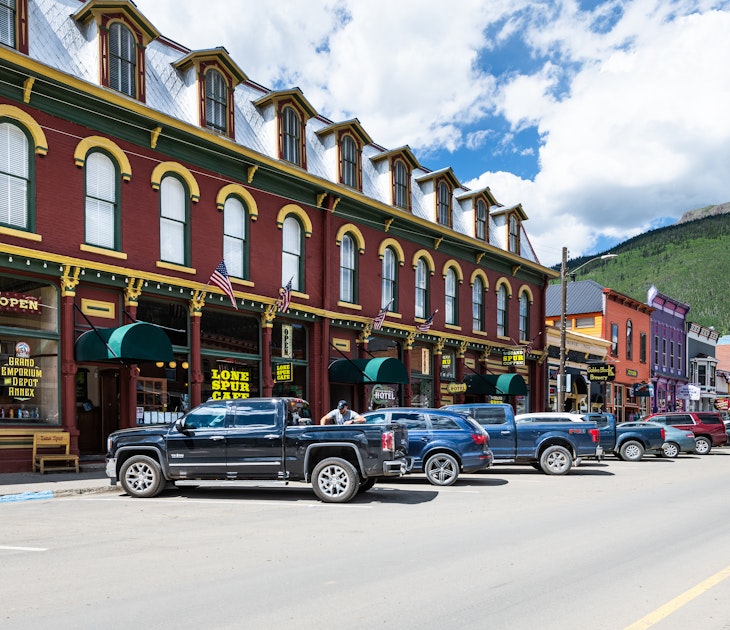
See the Southwest USA's most iconic landscapes on this epic road trip
Jan 22, 2021 • 6 min read

Tranquil image of sand dunes and beautiful blue sky, White Sands National Monument. sumikophoto / Shutterstock
Tucked away near the New Mexico–Texas border lie three unique attractions: White Sands National Monument, Carlsbad Caverns and the Guadalupe Mountains National Parks. Visitors can climb to the top of Texas’ highest peak, journey 1000ft below the earth’s surface, or scramble up the world’s largest – perhaps only – gypsum dune fields.
With less than four hours' drive time (Carlsbad Caverns and the Guadalupe Mountains are only about 30 minutes apart) to hit all three spots, the region is perfect for time-strapped tourists looking to cross names off their national park bucket list. But while it’s possible to visit all three in a weekend, odds are you’ll find a reason to linger.
Editor's note: Please check the latest travel restrictions before planning any trip and always follow government advice.

White Sands National Monument
Although White Sands National Monument is the most heavily visited out of the three sites, it was under the radar for many years until it officially became the United States' newest national park, and New Mexico's second, in December of 2019. That it got so little traffic for so many years was a boon for the ecosystem, but unfortunate because it’s easily one of the most unique properties within the National Park Service system.
The white sand – technically it’s gypsum – stretches for miles, forming massive dunes. You’ll have to remind yourself it isn’t snow. The pristine dunes are gorgeous and make for great photos, but depending how crowded the park is that day, you might need to hike a bit to find untrampled spots.
Unlike normal beaches, there isn’t a tide to erase the multitude of footprints and sled tracks left by visitors. Ranger Robin Milne suggests trying to time your visit for after a rain or windstorm, which will give you a fresh canvas.
Buy or rent a plastic sled at the visitor center and start looking for a steep slope for some adventurous fun. If you plan to hike, be sure to bring a compass or, at the very least, know how to use the compass app on your phone. With the exception of the backcountry trail, there are no real trail markers on the dunes, so it’s easy to get lost. Milne says the park conducts between 10 and 15 search and rescue operations each year.
Services are limited inside the park, so you won’t find any restaurants or many food options. Bring snacks or a picnic lunch. If you can, visit during one of their popular full-moon hikes every month. Plan to devote two or three hours wandering the sand dunes.
There are a handful of backcountry camping spots in the park, all of which require about a one-mile hike and a permit – be sure to get there as early as possible to snag your spot. Sorry, RVers, no overnight stays for you – you'll have better luck in nearby Alamogordo.
For those who prefer indoor accommodations, Alamogordo is also full of cabins and casitas you can rent on VRBO. The White Sands Motel is another lodging favorite with a classic neon sign that's hard to miss.

Carlsbad Caverns National Park
Unless you have a goal of visiting every US national park, it’s easy to skip Carlsbad Caverns – but that would be a huge mistake. Carlsbad Cavern’s Big Room is incredible: the trail around the cave stretches more than a mile and takes visitors past fascinating rock formations, stalactites, and even some natural water features.
Many of the most interesting spots are well lit with spotlights, making for dramatic photos. And although the biggest spotlight is on the caves, visitors have access to more than 50 miles of hiking trails on the surface.
The Big Room's self-guided tour is free for visitors with the America the Beautiful pass. Ranger-led hikes will take you to other sections of the caverns (including King's Palace, Left Hand Tunnel, Hall of the White Giant), but you’ll have to pay extra for those tours.
The Big Room self-guided tour takes 45-90 minutes, depending on how fast you walk, the number of photos you take, and so on. If you have time, skip the elevator down and take the mile-long hike down to the mouth of the cave. The last tour starts around 4 pm, so you need to get your ticket by 3:15 pm.
From late-May through October, the park also offers nightly bat-flight programs, allowing visitors to witness the bats emerge from the cave to feed. Because bats can easily be disturbed by sounds and lights, electronic devices like cell phones and cameras are not allowed. Also, avoid wearing any clothing that's you've previously worn into a cave, even if you've washed it since to help protect bats against white nose syndrome.
As in White Sands, only backcountry camping is allowed inside the park, but you can park your RV either at Guadeloupe Mountains National Park or Lincoln National Forest, which sits between the two national parks. If you stop in the national forest, be sure to take the quick hike to gorgeous Sitting Bull Falls.
For hotels and vacation rentals, check out the offerings in nearby Carlsbad, New Mexico. If you're road tripping, the Post Time Inn is a hiply renovated motor lodge that's hard to beat.
Guadalupe Mountains National Park
Despite being so close to Carlsbad Caverns, Guadalupe Mountains National Park only receives about a third the number of visitors, and less than half the visitors of Big Bend National Park, which sits firmly in Texas five hours to the south and far from any major city or airport. That's a shame because the Guadalupe Mountains has a lot going for it.
If you just want to stop at the visitors’ center and take a few photos of the mountains, you can be in and out of the park in an hour. If you want to hike one or more trails, it’s easy to spend an entire day. The park offers quite a few nice hikes, including a nearly 9-mile trek up to Guadalupe Peak, the highest spot in Texas.
The 4-mile Devil’s Hall hike promises some pretty spectacular rock formations, or walk the 3-mile Smith Spring loop that leads to the eponymous watering hole. Even when the spring is running dry, the hike itself is filled with gorgeous views.
Although Guadeloupe Mountains National Park isn’t an officially designated Dark Sky Park like its big brother Big Bend National Park, you can get some spectacular shots of the Milky Way during your visit. Many of the campers in Pine Springs campground will have either a telescope or camera gear.
Like the other two parks in this road trip, Guadalupe Mountains National Park doesn’t have a restaurant or lodge, so bring your own food. And if you don’t want to hike out to one of 10 designated backcountry campsites, you still have plenty of options.
The Dog Canyon area has 9 tent and 4 RV spots, while Pine Springs has 20 tent and 20 RV sites. There are no hook ups, but water is available. All sites are first-come-first-served. Meanwhile, nearby Carlsbad offers other lodging options.
You might also like:
The Grand Circle is the ultimate US Southwest road trip
A beginner's guide to backcountry camping
The Southwest, USA's 7 best hiking trails
This article was originally published in November 2019 and updated in January 2021.
Explore related stories

Road Trips
The 7 best road trips in Arizona to discover ancient culture and modern wondersNov 8, 2024 • 6 min read








